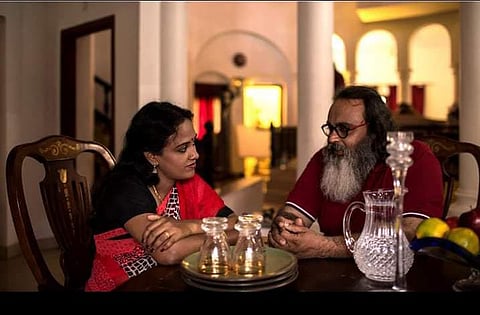

#Ajayan
In an oft-explored narrative in cinema, Bharathapuzha—the debut feature film by celebrated documentary filmmaker Manilal—delves differently into the life of a sex worker Sugandhi and the people intertwined with her existence. The film’s profound and evocative portrayal sets it apart, rendering it both unique and authentic. The film, which won accolades when the State awards were announced in 2021, is set for release very soon.
Set against the vibrant backdrop of Thrissur, Bharathapuzha unfolds in its unique dialect, weaving the tale of Sugandhi, brought to life by Siji Pradeep, an alumna of the School of Drama in Thrissur. As Sugandhi navigates through life, she encounters a series of characters, each carving out a distinct relationship with her. Her resilience, grace and indomitable spirit illuminate her journey, earning her the special jury award. The film sparked controversy when a jury member remarked that Siji deserved the best actor award. Manilal’s direction impeccably captures Sugandhi’s compelling presence, etching it into the very essence of the film.
The title Bharathapuzha, named after the river that has inspired countless literary works in Kerala and remains deeply ingrained in the hearts of Keralites, poetically mirrors the ebb and flow of Sugandhi's life and experiences.
From the allure of alcohol to the complexities of sex and extra-marital affairs, the film navigates these themes with a subtlety that sets it apart. Sugandhi’s journey around the iconic Swaraj Round of Thrissur symbolically mirrors the cyclical struggles of her life, a continuous loop with no clear beginning or end.
Several scenes in the film linger in the mind, offering profound reflections. One such moment unfolds when Sugandhi, in a moment of raw honesty, confesses to a priest (portrayed by Manikantan Pattambi) that she is a sex worker. The priest, initially aghast, ultimately reminds her that morality isn't hers alone to uphold, prompting the audience to ponder deeply on the nature of moral responsibility. Another striking scene occurs when Sugandhi, speaking to the autodriver Shabu who harbours a quiet affection for her, declares that men are driven by pleasure while women bear the burden of toil. She extends this comparison with biting clarity, noting how men drink, relieve themselves wherever they please, and work only when it suits them.
Sugandhi's enchantment at a theatre workshop led by Jose Payammal (portrayed by Jose himself) is nothing short of mesmerizing, as she becomes immersed in the spontaneous (impromptu) creation of a script, leaving the audience in a state of awe and wonder. The man in a wheelchair whom Sugandhi visits shares a bittersweet contentment over his wife's departure. Yet, he confides in Sugandhi that her presence is essential to change the "stench of a male-dominated house". Another powerful moment unfolds when Sugandhi joins the autodriver on a visit to a de-addiction centre. Here, an inmate challenges Shabu, questioning whether alcoholism is truly a family problem. These scenes, rich with nuance, provoke the audience to engage with and reflect on pressing social issues.
Jomon Thomas's masterful camera work is a visual delight, capturing the essence of each scene—from the rugged ambiance of the tile factory to the expansive kole lands, the serene hills near Wadakkanchery, the graceful flight of birds, and the autorickshaw meandering through the iconic Swaraj Round. Each frame is a work of art. Nalini Jameela, celebrated for her work The Autobiography of a Sex Worker, earned accolades for her costume design, which authentically enhances the film's narrative. The haunting score by Sunil Kumar further deepens the film's somber tone, resonating with the profound themes woven throughout.
The film features a vibrant ensemble of characters, each portrayed with remarkable authenticity by actors deeply rooted in Thrissur's cultural landscape. Jose Payyamal, Dinesh Vijayan, Sreejith Ravi, MG Sasi, Jayaraj Warrier, Manikandan Pattambi, Irshad, Sunil Sukhada, and Dinesh Prabhakar breathe life into their roles, adding depth and nuance to the narrative. Their performances, steeped in the rich dialect and ethos of Thrissur, elevate the film, making each character memorable and integral to the story's unfolding.
Manilal’s transition from documentary to feature filmmaking showcases his profound mastery of the cinematic art. His film, devoid of overt philosophizing, unflinchingly presents raw and authentic scenes that resonate deeply, sparking broader social conversations. As this work reaches a wider audience, it holds the potential to ignite significant discourse, underscoring the power of cinema to reflect and challenge societal norms.
